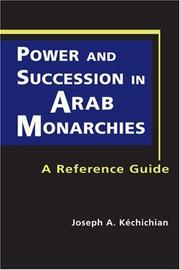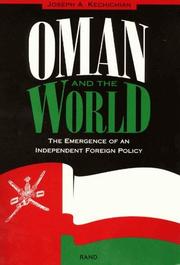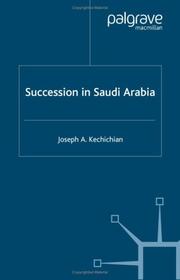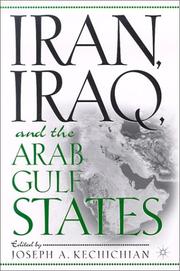| Listing 1 - 7 of 7 |
Sort by
|

ISBN: 1588269957 1849724318 9781588269959 9781849724319 9781588265562 1588265560 Year: 2008 Publisher: Boulder, Colorado : Lynne Rienner Publishers,
Abstract | Keywords | Export | Availability | Bookmark
 Loading...
Loading...Choose an application
- Reference Manager
- EndNote
- RefWorks (Direct export to RefWorks)
Power and Succession in Arab Monarchies provides an essential compendium of information regarding the politically charged issue of succession in Bahrain, Jordan, Kuwait, Morocco, Oman, Qatar, Saudi Arabia, and the United Arab Emirates.
Monarchy --- Political stability --- Petroleum industry and trade --- Energy industries --- Oil industries --- Destabilization (Political science) --- Political instability --- Stability, Political --- Consensus (Social sciences) --- Legitimacy of governments --- Kingdom (Monarchy) --- Executive power --- Political science --- Royalists --- Government policy --- Political aspects --- Persian Gulf Region --- Politics and government --- Monarchie --- Stabilité politique --- Pétrole --- Case studies. --- Cas, Etudes de --- Industrie et commerce --- Politique gouvernementale --- Aspect politique --- Persique, Région du Golfe --- Politique et gouvernement

ISBN: 0833023322 Year: 1995 Publisher: Santa Monica, Calif. : Rand,
Abstract | Keywords | Export | Availability | Bookmark
 Loading...
Loading...Choose an application
- Reference Manager
- EndNote
- RefWorks (Direct export to RefWorks)
Oman --- Oman --- Oman --- Oman --- Foreign relations --- History --- Relations extérieures --- Histoire

ISBN: 0312238800 Year: 2001 Publisher: Basingstoke Palgrave
Abstract | Keywords | Export | Availability | Bookmark
 Loading...
Loading...Choose an application
- Reference Manager
- EndNote
- RefWorks (Direct export to RefWorks)
Saudi Arabia --- Saudi Arabia --- Kings and rulers --- Succession. --- Politics and government
Book
ISBN: 1782846565 Year: 2019 Publisher: Brighton ; Chicago ; Toronto : Sussex Academic Press,
Abstract | Keywords | Export | Availability | Bookmark
 Loading...
Loading...Choose an application
- Reference Manager
- EndNote
- RefWorks (Direct export to RefWorks)
After the conservative Arab Gulf Monarchies--Bahrain, Kuwait, Oman, Qatar, Sa'udi Arabia and the United Arab Emirates (UAE)--joined forces on 25 May 1981 within the Gulf Cooperation Council (GCC), few fathomed that security requirements on and around the Arabian Peninsula would be so precarious and for so long. To answer their search for permanent stability, Arab Gulf rulers erected a regional alliance that sought to integrate internal and regional defenses, as well as strengthen their existing socio-economic ties. Several of the monarchies even hoped that coordination on foreign policy issues over which near unanimity existed could, eventually, lead to a full-fledged union as envisaged in the organization's founding charter. Between 1981 and 2015 these Arab Gulf monarchies experienced major socio-political transformations resulting from upheavals throughout the Arab and Muslim worlds. The perceived necessity to bring about a full-fledged union has come into conflict with entrenched viewpoints from regimes that value traditional military/political roles and norms. In this new study, Joseph A. Kéchichian provides an evaluation of GCC States' military institutions to better evaluate whether a stable alliance is capable of enduring over the next few decades, and how civilian leaders perceive the role and influence of their military officers for the task. Kéchichian raises fundamental questions over internal, regional and international threats, including an existential challenge emanating from the Islamic revolutionary government of Iran.
Gulf Cooperation Council. --- Persian Gulf Region --- Armed Forces. --- Military policy. --- History, Military.
Book
Year: 1995 Publisher: Santa Monica, CA : RAND Corporation,
Abstract | Keywords | Export | Availability | Bookmark
 Loading...
Loading...Choose an application
- Reference Manager
- EndNote
- RefWorks (Direct export to RefWorks)
In July 1970, amid vast turmoil throughout the Persian Gulf region, Qaboos bin Sa'id led a successful coup against his father and proclaimed himself the new Head of State. Sultan Qaboos promised to institute a modern, efficient, and just government and to establish friendly relations with neighboring countries. Facing significant internal challenges to his authority, Qaboos restored internal order through effective military and economic measures. Simultaneously, he adopted long-term principles that facilitated the introduction of capable foreign policy initiatives, based on nonintervention in the affairs of other countries, respect for international law, and nonalignment. Today, the Sultanate of Oman remains stable--its foreign policy flexible by nature, its regional preeminence assured. This report systematically analyzes the foreign policy of the Sultanate. It traces the origins of the Omani nation-state, identifies trends in Omani diplomacy, and examines the Sultanate's foreign policy in the modern era, focusing on relations with states on the Arabian Peninsula and in the Persian Gulf region, with the West, and around the world.
Oman --- Oman --- History. --- Foreign relations.

ISBN: 0312293887 Year: 2001 Publisher: New York Houndmills Basingstoke Palgrave
Abstract | Keywords | Export | Availability | Bookmark
 Loading...
Loading...Choose an application
- Reference Manager
- EndNote
- RefWorks (Direct export to RefWorks)
Persian Gulf Region --- Persique, Région du Golfe --- Persique, Région du golfe --- Politics and government --- Congresses --- Foreign relations --- Politique et gouvernement --- Congrès --- Relations extérieures --- Persique, Région du Golfe --- Persique, Région du golfe --- Congrès --- Relations extérieures
Book
Year: 1993 Publisher: Santa Monica, CA : RAND Corporation,
Abstract | Keywords | Export | Availability | Bookmark
 Loading...
Loading...Choose an application
- Reference Manager
- EndNote
- RefWorks (Direct export to RefWorks)
This report argues that the Persian Gulf war rapidly accelerated an ongoing polarization of the Arab world. The result has been an Arab community split into two distinct camps: aspiring non-autocratic states arrayed against more countries that embrace traditional political values and processes. From the tangled skein that characterizes Mideast politics, four major threads can be identified: (1) the re-establishment of the authority of Baathist Iraq and its rebuilding of ties to the Arab world; (2) the political and military awakening of Saudi Arabia; (3) the intractable internal dilemmas of the Gulf shaykhdoms; and (4) the continuing challenge to the ruling establishments to introduce true political reform. Political and military relations between the United States and the Gulf Cooperation Council will continue to grow for the foreseeable future. But growing internal dissatisfaction in the Gulf states may spark anti-American sentiments, and these issues need to be better understood.
| Listing 1 - 7 of 7 |
Sort by
|

 Search
Search Feedback
Feedback About
About Help
Help News
News